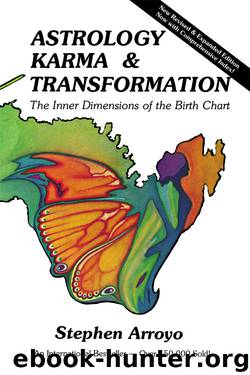Astrology, Karma & Transformation by Stephen Arroyo

Author:Stephen Arroyo
Language: eng
Format: epub
Publisher: CRCS Publications
Aspects with Neptune
Like Uranus aspects, Neptune aspects also indicate specific dimensions of our lives (depending on the other planet involved) wherein we have an urge to experience a new level of freedom. However, there is a subtle but highly important difference in the kinds of freedom that Uranus and Neptune represent. Whereas Uranus symbolizes an individualistic, ego-centered, willful urge for freedom of expression, Neptune ideally represents an urge toward ultimate, transcendent freedom wherein we lose the limitations of the ego-personality and become free from the boundaries of both intellect and ego. Neptune indicates a yearning to experience a state of oneness with all of life, a merger with the whole of existence, and the dissolution of all boundaries, feelings of separateness, and ego-centricity. Perhaps the most practical way of expressing Neptune’s essential nature is to say that its aspects represent ways in which we try to escape from all limitation: tradition, ego, the material world, and the harshness of everyday life. Although many books have accurately stated that Neptune aspects are related to imagination and that the challenging aspects often reveal deception, confusion, and dissipation, they usually fail to emphasize the most important fact about Neptune aspects: namely, that any close aspect of Neptune with a personal planet or with the Ascendant indicates the possibility of coming to an immediate realization of the spiritual dimension of experience and the oneness of all creation; and that the challenging aspects more often than the flowing ones manifest as an individual’s taking definite steps to incorporate spiritual ideals into his or her everyday life. It is true that such aspects can be expressed in negative ways such as self-deception, pseudo-spiritual egotism, self-destructive escapism, and the habit of evading all responsibilities to self or others. However, even such negative manifestations of these aspects are often an indication that the person is at least beginning to feel the stirrings of the soul’s deepest yearnings but that he or she has not yet learned the essential meaning of these feelings or how to discriminate between the various ways of dealing with them. There is often confusion due to the fact that the person still looks to the outer world for the fulfillment of higher states of awareness or for a full experience of a spiritual ideal. This naturally leads to disillusionment since in essence Neptune represents an attunement to the boundless resources of the inner world and to the reality of intangible levels of experience. In fact, we can define Neptune’s challenging aspects as phases of life wherein we learn about spiritual values and realities in a subtle way by experiencing disillusionment to the full! The dimension of experience wherein we confront this disillusionment is symbolized by the planet in close aspect with Neptune.
As we mentioned in Chapter 3, the challenging aspects of Neptune are often more creative and productive than the flowing angles. We could in fact call the dynamic Neptune aspects with personal planets “spiritual seeker aspects.” This of course does not mean that
Download
This site does not store any files on its server. We only index and link to content provided by other sites. Please contact the content providers to delete copyright contents if any and email us, we'll remove relevant links or contents immediately.
| Confucianism | Feng Shui |
| I Ching | Jainism |
| Karma | Shintoism |
| Sikhism | Tao Te Ching |
| Taoism | Tibetan Book of the Dead |
| Zoroastrianism |
The Tao of Physics by Fritjof Capra(2276)
Human Design by Chetan Parkyn(2072)
The Diamond Cutter by Geshe Michael Roach(2059)
Feng Shui by Stephen Skinner(1939)
The Alchemy of Sexual Energy by Mantak Chia(1860)
Tao Te Ching by Lao Tzu(1841)
365 Tao: Daily Meditations by Ming-Dao Deng(1620)
Tao Tantric Arts for Women by Minke de Vos(1599)
Sun Tzu's The Art of War by Giles Lionel Minford John Tzu Sun(1541)
Sidney Sheldon (1982) Master Of The Game by Sidney Sheldon(1520)
Buddhism 101 by Arnie Kozak(1510)
Karma-Yoga and Bhakti-Yoga by Swami Vivekananda(1495)
The Analects of Confucius by Burton Watson(1434)
The Art of War Other Classics of Eastern Philosophy by Sun Tzu Lao-Tzu Confucius Mencius(1428)
The Way of Chuang Tzu by Thomas Merton(1364)
Tao te ching by Lao Tzu(1363)
The New Bohemians Handbook by Justina Blakeney(1355)
The Sayings Of by Confucius(1315)
Bless This House by Donna Henes(1269)
